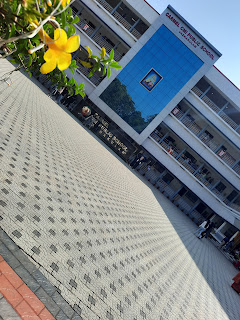Creating Winners
These are busy days for me and that's the reason for the irregularity of my presence here. What keeps me busy is the state level cultural competition of CBSE being held in my school. The event started yesterday and will go on till Sunday.
About 7000 students from 1400 CBSE schools of Kerala are here on the campus of my school participating in events like singing and dancing and acting being held on 21 venues . These are all winners from their respective zones.
The purpose of this Kalotsav is the all-round development of the students of CBSE schools. It is based on the conviction that every student is a precious individual with immense potential. Events like this seek to provide the students with a hierarchy of platforms where their potential can be materialized, skills honed, and personality unfolded to its ultimate fulfilment.
Education is not all about textbooks and the labs. In fact, there is more that should happen outside the classrooms. The writer and the musician and the artist are born not in classrooms. Ironically, the classroom seems to stifle such potential. (Sometimes the potential does show itself in spite of the stifling. The other day I was amused by the opening sentence of an article written by a grade 11 student of mine. The topic was 'Students and Social Media'. My girl warmed the cockles of my heart with this opening: 'A mobile phone without internet is like a tomb without a corpse.' I loved the analogy and its creator. I prophesied a prospective auctorial future for her.)
I love that sort of creativity in my students. I gave my phone to a grade 9 student who was assisting me at the announcement desk yesterday, Delna Anna Benny, and asked her to click a few snaps from the Kalotsav. Delna turned out to be creative too. Let me bring some of her pics here to end this post.
 |
| Trophies for winners |



Hari OM
ReplyDeleteWhat a heart-warming and uplifting thing, to see so many youngsters striving for improvement and approval. Seems you had an enjoyable time too! YAM xx
It's still going on and I get to meet a lot of students and teachers/parents from other places.
DeleteLoved the last pic.
ReplyDeleteSo many trophies!
DeleteSo my daughter not a very studious student but when I went for the parent interaction surprisingly teachers didn't have anything bad to tell about her because they said that she knows the stuff just that she can't reproduce it on papers. As you said real learning happens outside the text book
ReplyDeleteSome highly successful people were not particularly good at school.
DeleteMissing school and these kalotsav days❤️
ReplyDeleteWelcome back 😊
Delete